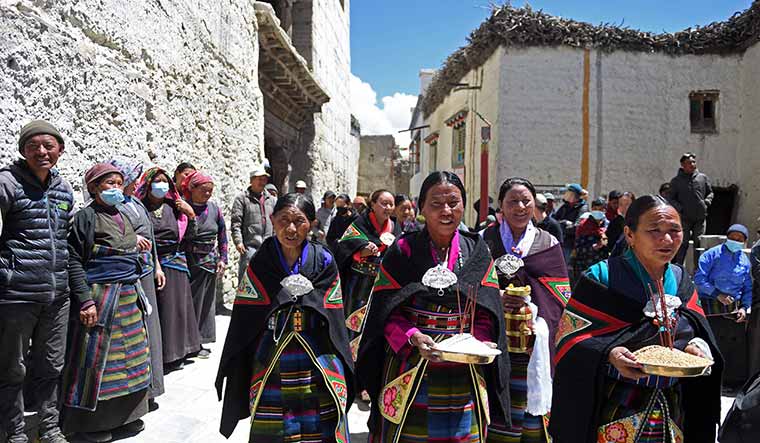Shangri-La might just be an imaginary place in writer James Hilton’s book, Lost Horizon (1933). Then again, maybe not. In this uncertainty lies my hope. Every time I get a chance to travel to the Himalayas, the hope of finding Shangri-La is rekindled. This time, I am heading to Lo Manthang, a walled city in Nepal’s Upper Mustang, to take part in Royal Enfield’s Himalayan Adventure motorcycle ride. Not many tourists have experienced the desolate yet dreamy world of Lo Manthang. The roads that lead you there wind through a breath-taking high-altitude Himalayan vista. To experience it, you have to be free from the distractions of the world below. That is why I decided to stay away from my mobile phone for two weeks. Would I be able to do it in this age when life without mobile connectivity may be an existential crisis waiting to happen?
This is not the first time I am going incommunicado. I had stayed away from my iPhone for 10 days during a Vipassana meditation course in 2012. But the words OTP and OTT were non-existent in those days. Now, the situation is different. Your mobile number is your identity, your brain is stored on your phone’s cloud, and if you do not constantly update your status on social media, you might as well have disappeared off the face of the earth.
There was a sense of adventure as I switched off my mobile phone en route to Kempegowda International Airport in Bengaluru. For the next two weeks, I would be entertained by nothing but my own company. No time would be wasted on searching for power points to charge the phone. No looking at messenger apps in anticipation of messages that never arrive. No propaganda forwards or nuisance news alerts. For the travel procedure, I was prepared with printouts of vaccination certificate, air tickets, hotel booking details and itinerary. On this trip, it was only going to be me, my motorcycle and the mountains!
The road to Lo Manthang offers no easy ride. Winding your way between sandy tracks, puddles and pebbles demands total concentration. Motorcycling, that way, can teach you so much about life. About how to tackle the hurdles that come your way or when not to cross the limit. Riding is a kind of meditation. I rode with complete calm, my view of the distant snow peaks clouded by the incessant dust and rocky terrain. Finally, I saw a wooden signboard that said, “Lo Manthang—5 Minutes,” with an arrow pointing to the right. The journey had been as breath-taking, if treacherous, as the destination.
That night, I nestled within the quilt and went to sleep early. Without the need to look at unread mails or missed calls in the morning, I woke up brimming with energy, all set for impromptu adventures. One day, I visited three ancient monasteries in the walled city to make friends with its modest residents. Another day, I tried to summit a trackless barren mountain on my bike. Another time, I searched for ammonite fossils in the river bed of Kali Gandaki, which are sold as shaligram stones to Indian pilgrims who visit Nepal.
Life unfolded in high-definition without the mobile phone. The fragrance of the high-altitude trees filled the air and I could make out minute variations in the shades of the mountains, whose peaks split asunder the misty skies. It was like my Himalayan bike was the time machine that took me to a pristine and peaceful time.
The Lo Manthang town is situated in a high-altitude valley where oxygen is thin. And you get mobile network only on select service providers. Many of the riders were feeling Acute Mountain Sickness (AMS). What amazed me was that they were panicking not because of the lack of oxygen in their bodies, but for the lack of network on their phones.
Overuse of mobile phones is a kind of disorder. “If not managed well, mobile dependency will turn into compulsive use, resulting in addiction,” says Dr Manoj Kumar Sharma, clinical psychologist and coordinator of SHUT (Service for Healthy Use of Technology) clinic at NIMHANS, Bengaluru. He found better cognitive productivity, digestion and physical fitness in moderate mobile users.
What I learnt from my mobile-less adventure is that you can survive anywhere without a cell phone if you plan your trip well. Once in a while, going to Amazon should invoke images of untamed rivers and emerald forests instead of the homepage of a shopping website. Ultimately, you do not need to look outside for your Shangri-La. You can find it within you, submerged somewhere deep within your soul—in a fortress that no mobile signal can penetrate.



